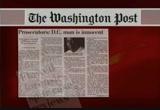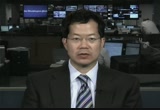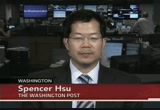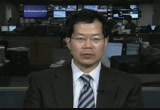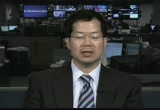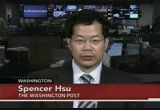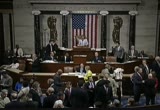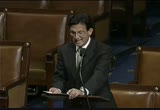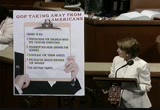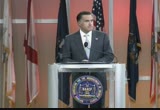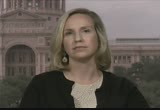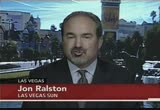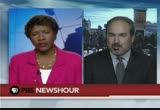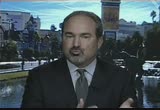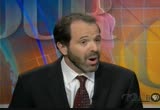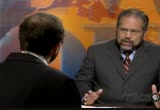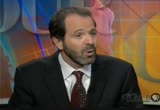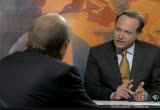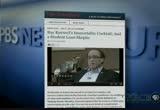tv PBS News Hour PBS July 11, 2012 5:30pm-6:30pm PDT
5:30 pm
captioning sponsored by macneil/lehrer productions >> ifill: the f.b.i. and the justice department have launched a review of thousands of criminal convictions that may have been based on flawed forensic evidence. good evening, i'm gwen ifill. >> woodruff: and i'm judy woodruff. on the "newshour" tonight, we have the latest on the investigation from spencer hsu of the "washington post." >> ifill: then, we update the politics of the health care debate, as house republicans vote for repeal and some governors say they cannot afford the law's plan to expand coverage for the poor. >> woodruff: from northern ireland, special correspondent
5:31 pm
kira kay reports on the religious divide, still present 14 years after the peace agreement that ended the decades of violence. >> reporter: this small area, the tensions break out where catholic area butts up against protestant area. >> ifill: ray suarez talks with alexander thier abt whether s. enomic aid to afghanist is having s innded effect. >> woodruff: and jeffrey brown sits down with producer, director and movie buff george stevens, jr. to talk about the art of making films and the masters of the craft. >> it's always this struggle between art and commerce. it's like a shotgun marriage of money and art. >> ifill: that's all ahead on tonight's "newshour." major funding for the pbs newshour has been provided by:
5:32 pm
and with the ongoing support of these institutions and foundations. and... this program was made possible by the corporation for public broadcasting. and by contributions to your pbs station from viewers like you. thank you. >> woodruff: a major look at the f.b.i.'s handling of forensic evidence is underway. yesterday, the justice department announced it will conduct a review of thousands of criminal cases, dating back to 1985, where hair and fiber analysis led to convictions. the examinations were detailed in a front page article in today's "washington post." included were the stories of two
5:33 pm
men wrongfully convicted on flawed hair analysis. they've since been exonerated by d.n.a. testing-- one just yesterday. the justice department review comes after the "washington post" identified those two men, and others as part of a report on forensic errors by f.b.i. labs. national reporter spencer hsu wrote today's piece. he joins us now from the "washington post" newsroom. spencer, welcome. so this investigation of forensics mainly was triggered by flawed hair analysis, is that right? >> that's right, judy. the concern has been building for decades really, that hair and other forensic disciplines have not had the scientific research to i guess validate or underpin their approach n. the case of hair, skeptics have raised the point that it might be subjective, given
5:34 pm
hair examiner, two different examiners might describe the same hair in different ways, the same examiner might describe it differently at different times. there was no agreement on how many character it had to be alike fothe be a match declared. there was no population studies or statistics to answer the question of how often the hairs of two different people might appear to be the same or how often a given number of characteristics might match. to resolve these questions the f.b.i. has long said that a hair machl only shows that you can exclude two people, my hair might not look like your hair, but it can only say that a hair looks like minor could have come from me in a class of folks like me. the problem has been that in trials, f.b.i. examiners, other experts and prosecutors have been tempted to fill in the plank for injuries, how likely is it, what are the odds. and they've gone to say things like two in 10 million or two in 10,000 and use bogus statistics to give an air of
5:35 pm
certainty. they've overstated the value of a match without specific backing for it. and they did this at a time when their own studies were showing dna testing showed in 2002 examinations were wrong, matches were declared matches were wrong 11% of the time. they switched their standard in 1996 to begin backing up hair comparison matches with dna testing. yet at the time they were warned that agents were exaggerating their testimony, there was no regular checking up on what agents were saying in court or on documenting their findings in a way that would make them proveable, repeatable as a scientific method. >> woodruff: with so much at stake, how could the standards have been as loose as they were? >> it's a difficult question. i mean, repeatedly over time, fingerprints started as a reform in the i think in the 1920s, a way to apply sort of
5:36 pm
solid quantitative physical science to the notion of catching criminals. and over time each step has come in as an improvement on the last, but it was only until dna arose was validated through scientific and medical practices that people, the scientists had developed statistical basis for saying how often someone would have dna that include this numb ofmatcs. when they compared the rig or of dna to things like fingerprint science or even hair science, they found that the same type of research hadn't been done. so at the time we hear from agents and examiners, this was the best we had, we thought it was good. it was only in 2002 when we realized that we might be wrong 11% of the time. the caveat is that what we're finding is in these cases from the late 1970s early 80s, even at that time the testimony was beyond what was scientifically acceptab at the time. i ink that's what has prompted finally, i say
5:37 pm
finally, you know, there have been defense lawyers, a project has been working on this for many years who have tried to show through cases and examples and looks like the policy makers now have acknowledged that they add something to their concerns. >> woodruff: can you briefly give us an example of someone who was wrongfully convicted? >> you know, we have a couple in the district. we wrote about kirk godum yesterday, prosecutors apologized to him, said he should be exonerated. heas conviedof 1981 rape on the basis of his f.b.i. testifying that his hair was found in the victim's bed clothes. the victim six weeks after the case picked his picture out of a fa to array, and in talking about an unrelated matter thought he looked like the composite sketch. turned out dna testing showed it wasn't his hair. more precise testing showed that only one man could have
5:38 pm
left the stains recovered from the crime scene, that man was t kirkodum, he was a convicted sex offender, turns out. the examer and the prosecutor misstated or turned out to be in error. this is the third case of three different men who were implicated by three different f.b.i. hair agents that in the nation's capital, just 600,000 people, three men who were in prison between 20 and 30 years each on the basis of flawed evidence. >> woodruff: and quickly, the type of crimes we're talking about, murder, rape? >> hairs tend to be taken from violent crimes. like murder, like rape. the palties invol tend to be longer term, 20 or 30 years, or life long parole or sex offender registry issues. >> woodruff: of the thousands of cavess that they are now going back and looking at again, is there some sense of how many mistakes, how many cases may be overturned, convictions rather? >> the last time there was a review like it this was, they
5:39 pm
looked at 7,000 cases hand eled by 13 agents including one hair and fiber examiner, the majority are not positive findings. the majority may b only a quter are 20% result in convictions. of those there's other evidence or individuals committed other crimes. we found that there were 250 cases where cases were still questionable that the forensic work was sent out for retesting. one of our cases was a man that was never notified of this. we're looking at a universe potentially scores if not hundreds of candidates, how many might turn to be wrongfully convicted is anyone's guess, but we found again three in the distrt. 60000 ople in a nation of 300 million. there are likely more. >> woodruff: spencer hsu, some fine reporting spencer at the "washington post". thank you. >> thank you. >> ifill: still to come on the "newshour":
5:40 pm
the political back and forth on health care; the ongoing religious tensions in northern ireland; what development aid has accomplished in afghanistan and the masters of movie-making. but first, the other news of the day. here's hari sreenivasan. >> sreenivasan: stocks slid again today on disappointing news from the federal reserve. minutes from the fed's june meeting showed policymakers are divided over the need for new stimulus measures. that news disappointed investors. the dow jones industrial average lost more than 48 points to close at 12,604. the nasdaq fell 14 points to close just below 2,888. the city of san bernardino has joined the ranks of california cities now heading for bankruptcy court. the city council voted last night to take that step, as it faces a $45 million budget hole. san bernardino is still suffering the effects of the housing market crash and continued high unemployment. it is the third california community to file for municipal bankruptcy in recent weeks. the government of spain has imposed a new round of austerity measures-- one day after the european union approved a major
5:41 pm
bailout for spanish banks. the austerity plan includes new sales tax increases coupled with another round of spending cuts. the announcement came as thousands of coal miners protested in the streets of madrid against any more cuts. later, some of the demonstrators fought with police, who fired rubber bullets to disperse the crowd. the president of florida a&m university handed in his resignation today, in the latest fallout from a hazing scandal. james hammons was heavily criticized after the death of a drum major in the school marching band. robert champion was badly beaten in a hazing incident last november, and died of his injuries. 11 band members face trial on criminal charges in the case. those are some of the day's major stories. now, back to gwen. >> ifill: little more than a week after the supreme court upheld the affordable care act, the republican-led house of representatives once again signaled its displeasure.
5:42 pm
>> the bill is passed. >> ifill: with that, house republicans voted, yet again, to repeal the affordable care act. house speaker john boehner: >> when this bill passed, we were promised that healthcare law would lower costs and help create jobs. one congressional leader even suggested it would create 400,000 new jobs. well, guess what, it didn't happen. >> ifill: the house has voted to repeal or gut the healthcare law more than 30 times since it became law. but with democrats controlling the majority in the senate, the repeal won't become law before the supreme court upheld most of the president's healthcare law, including the individual mandate that requires people to obtain insurance or pay a penalty. the court ruled congress was within its right to approve a penalty under its taxing power. house majority leader eric cantor hit the law on that front. >> president and pelosi and colleagues on other side of aisle said not a tax.
5:43 pm
well, we now know, supreme court haspen--t is tax madame speaker, it's time to stop the broken promises, get back to the kind of healthcare that people want. >> ifill: democrats accused the republicans of wasting time on what they said is now settled law. peter defazio is from oregon. >> how about doing something productive, instead of political theater here? supreme court of the united states ruled, let's roll up sleeves and make it better. >> ifill: minority leader nancy pelosi tried to highlight some of the law's benefits, including guaranteeing coverage to children with pre-existing conditions. >> what is the takeaway of this debate. the takeaway is protections.
5:44 pm
17 million children have the right to healthcare coverage even if they have diabetes, asthma or leukemia. >> ifill: while most polls show the american public remains split on the law, a recent kaiser family foundation survey found a slight majority of independents believe republicans should end efforts at repeal. >> polls show a clear majority of americans want congress to move on from the health care issue and spend time on creating jobs. >> ifill: the battle also played out on the campaign trail today. speaking before a crowd at a naacp meeting in houston today, mitt romney drew boos when he said his policies, including repealing the health care law, would do more to help african- americans. >> if our goal is to create jobs we have to stop spending more than a trillion dollars, more than we take in every year. ( applause ) and so to do that, i'm going to
5:45 pm
eliminate every nonessential expensive program i can find that includes obamacare and i'm going to work to reform and save... ( boos ) >> ifill: at the white house, presidential spokesman jay carney criticized the republican-led hse. >> casting these votes againnd again and again, probably on average once every few weeks, does nothing to improve the bottom line for middle class families. >> ifill: outside washington, a number of republican governors are choosing not to enforce some parts of the law. the supreme court gave states the right to opt out of the medicaid expansion, which would cover about half of the 32 million uninsured who would get new coverage. medicaid is the joint federal/state program that provides health coverage for the poor. nebraska today became the latest state to indicate they will climb aboard that bandwagon, joining the republican governors of five other states, including
5:46 pm
texas and florida. that could mean four million fewer people would qualify for medicaid. governors in eight other states have also said they leaning toward opting out. health and human services secretary kathleen sebelius said today she has received letters from a dozen governors who support another part of the law- - the creation of the insurance exchanges that allow consumers to compare health plans. but the medicaid expansion remains an expensive sore spot r others. in nevada, we turn to jon ralston, political columnist, the "las vegas sun." in texas, to emily ramshaw, editor of the "texas tribune," and here with an overview in washington, to margot sanger- katz, health care correspondent for "national journal." march go, i want to start with you. give us a sense in general about what this resistance is about, who is resisting and why. >> i think there are two main reasons why we're seeing resistance from governors, one i think is political. they don't like the health care reform law, they have made arguments against it all
5:47 pm
along and this is a way of rejecting it and saying we don't want to participate in obama care, we don't want to help implement this law. the second problem is that a lot of these governors are concerned about the long-term costs associated with expanding their medicaid perhaps. the governors that have chosen not to implement tend to be in poorer states, and what means is they don't cover a lot of people on medicaid out in, but they would have to cover a lot if they did this. and time the share that states will have to pay will increase. >> ifill: do we know what those dollar signs are like yet? >> you know, it's a very slow phase out, for the first three years it's completely free. i think that's one of the reasons why secretary sebelius and the president have said that they're confident all the state will sign on, but it increases over time. in states like texas it will end up being more over time. >> ifill: emily ran shaw, you write that the governor has called this a brazen federal
5:48 pm
intrusion. what's his reasoning? >> sure. perry's reasoning really is th thiis masve intrusion, that states should be the ones deciding how to run their medicaid perhaps. i'm in a state where the governor ran for president on a states rights platform, where our attorney general really aggressively sued the federal government over federal health reform. so this is a state that was not likely to try to expand medicaid. >> ifill: so what is the cost in texas for opting out? we just heard from margot sanger katz, this was at least in the short term supposed to be a federal responsibility. >> sure. the estimation here in texas ishat between 20 an 2019 there would be about $100 billion federal dollars coming in at a cost to the state of about $6 billion. so obviously that's a tradeoff, 6 billion isn't pocket change, but at the end of the day texas is feeling really is that this is a massive intrusion and that texas would rather see a federal waiver where texas could operate medicaid as it sees fit, as opposed to implementing any
5:49 pm
kind of national program. >> ifill: first i want to apologize, i think i said you were the los angeles son sun, of course you're in las vegas. so i want to ask you about what governor sandova has said which is that he's unlikely to opt in. what's the reasoning there? >> i don't think you're hearing me, jon ralston, we'll get fwuk and i apologize again. back to you, margot sanger kaits. has this debate rest faithed at all in the polls, are people paying attention to the medicaid portion of this? >> i think that's right. i don't know that this is necessarily something that's registered at the federal level, but in such these state where the governors have said no to medicaid it will make more a difference. the medicaid expansion was supposed to be abouthalf the coverage expansion under the health care law, so around the country it's about 17 million people estimated that they'll get coverage through this expansion. if a lot states say no, that will erode one of the goals of the law which was to get insurance for the uninsured.
5:50 pm
>> ifill: we have seen some states where they have said no, but then they've said well maybe and it sounds like people haven't figured it out yet. has it trickled down to the state legislature? >> state legislatures will have to make the decision in almost every state. this medicaid expansion will have budgetary implications and state legislatures have control over that. i think lit take some time. some of the governors have strong statements in opposition, there are a couple who said we're definitely going forward. there's a much larger group in the middle who said we need to do budget estimates, we need to talk to our legislature, and i think we'll see probably in 2013 we'll see more of these states deciding one way or the other and doing what they need to do. >> ifill: jon ralston, i gather can you hear me now. >> i can. >> ifill: gone sandoval has said that nevada is unlikely to opt in. what does that mean? >> that's a very good question,
5:51 pm
gwen. i think his initial reaction which came on the same day a tv interviewer asked about it, and he said he's unlikely to opt in, and within 24 hours he was packing off a little saying they would not automatically opt into it. nevada provides very prenurious medicaid ben foits, we have about 3,000 people on the medicaid rolls now, the timates are 15, maybe 20% increase under the expansion. but the argument that sandoval is making is that the administrative costs that would go up, because as one of your previous guests said for the first three years it's full reimbursement on all the medical cost it. so the only real issue becomes a philosophical issue and the long-term cost for a state like nevada and some others. so i think sandoval is going to wait to see what happens with the economy and then make a decision. more interestingly, though, is that the liberal democrats in this state who have agitated foyears for more people on
5:52 pm
medicaid, appear to have had their vocal chords removed during this period and are not coming out with any kind of full throated embrace of this. why? during a campaign season no one wants to be seen as maybe at volunteer indicating for what sandoval said this might incur which is a tax increase. >> ifill: emily ramshaw, how does that play out in texas? >> the conversation in texas is a little different, it's an overwhelmingly conservative state and the people who turn out to vote here are overwhelmingly conservative. so there was a lot of relief that the supreme court ruling alwed texas opt out of mecaid. the people who might want to be included in this medicaid expansion traditional lay they are not the people who vote in texas. so a lot of the opposition to opting out of a medicaid expansion really isn't going to be heard here because this conservative state that's overwhelmingly republican legislature, really does not support participating in any kind of an expansion. >> ifill: is there anything right now that is before the state legislature if they're even in session that would speak to this?
5:53 pm
>> our legislature doesn't convene here until january. while recognize perry said texas is not goi tobe part of any expansion, some lawmakers quietly raised some eyebrows and said this decision actually is up to us, you know, we may be able to approach cms, approach the obama administration for some kind of agreement on this. and i think that's yet to be seen in this upcoming legislative session. >> ifill: so i wonder if people aren't waiting until after the election to see what happens, if romney is elected obviously there may be a different outcome. >> i think that's right, gwen. that's especially true of governor sandoval and some of the democrats in our legislature which also is not in session, doesn't convene until next february. they want to let this play out, they don't want to take a strong stand during an election cycle. and sandoval is very close to rick perry and i think they're in sync on this issue, perry was one of his mentors and to some extent he's following that lead. but he's also caught in between on this because he's
5:54 pm
the guy who was really conservative with he was running, but now is somewhat moderated his stances, has i've en let a couple of tax increases or not let taxes expire which has raised the ire ofhe right. so i think he's still finding his way. he doesn't have to be on the ballot again until 2014. but this is going to have an impact, even a minor impact on his budget for the next legislative session. >> ifill: are there other implications nationally? we are also talking about states like louisiana and florida where there are big medicaid populations. has there been pushback at all? have there been political ramifications from these declarations to pull out? >> i do think that it's a little early, but hospitals are very much in favor of the medicaid expansion. the health care law cuts funds that they get now to pay for people who don't have insurance, and the way the law was designed was that would get more payments from people who have insurance and especially through the medicaid program. so hospitals tend to be very powerful loans in state
5:55 pm
legislatures and especially safety in a hospital but really all hospitals feel strongly that they want to be able to have the medicaid expansion go forward. the other thing worth noting is that even though the populations that will be left out may not be the most powerful voting blocks in the state, i think it's hard politically for governors to say we won't do this expansion even though the federal government is paying 100% at the begining and even though the health care law will give financial assistance to people who have higher income to buy insurance and will give nothing to the poorer residents of those states. >> ifill: thank you all very much. >> woodruff: now, the simmering unrest in northern ireland. protesters have been out on the street in belfast for the past two days in advance of an annual parade tomorrow. "newshour" special correspondent kira kay looks at the ongoing religious tensions, 14 years
5:56 pm
after ireland's sectarian conflict formally ended. >> reporter: it's a compelling sight: the parades that wind their way down the shankill road, in the heart of belfast's protestant community. this parade is one of the first of the so-called marching season, when during the summer months, protestant northern ireland residents loyal to the united kingdom commemorate a series of historic moments. the largest takes place tomorrow, july 12, honoring protestant king williams victory over his catholic rival in 1690. wesley mccreedy has been marching the shankill road for 50 years. >> it's very much important to the way of the shankill road. the shankill road are a very loyal people, a very worthwhile people and they all stick together. >> that's what i was brought up to believe in, too. it's my culture. >> reporter: for joanne harrison and her husband tommy, the parades are a family tradition, but also a matter of self- preservation.
5:57 pm
>> have to keep the culture going. >> have to keep it going. we have to keep walking. it's the queens road, it's the queens highway. >> you have to keep it going, why? >> well, if we don't, the other side is going to take over! >> reporter: the other side she refers to are the catholics living just a few blocks away. the shankill is virtually encircled by catholic neighborhoods, and this small area, where west and north belfast meet, saw some of the worst violence of the 30 years of sectarian conflict here, known as the troubles. 3,500 people died in bombings, assassinations and clashes between nationalist militants like the i.r.a. and the british army and loyalist paramilitaries. in 1998 peace came, with an agreement that maintained northern ireland as part of the united kingdom, but brought catholic nationalist party sinn fein into government in a power- sharing arrangement with its former loyalist foes. >> it has been a remarkable journey. we're now in the control effectively of one of the most successful peace processes in the world today.
5:58 pm
>> reporter: martin mcguinness, once a militant ira commander, is now co-leader of the power- sharing government. thrghouthe coursef the last 14 or 15 years, many things that were considered unimaginable have actually happened. >> reporter: downtown belfast, once cordoned off by security fences and army checkpoints, now hosts bustling streets and cafes. a new museum about the titanic, built in belfast, beckons tourists. >> we've been working away at trying to attract foreign direct investment. we've brought on thousands of jobs over the course of the last couple of years. you go on the streets of belfast and derry, there's been a transformation. all at sd, we stl ve conscious of the fact that a lot of work needs to be done. >> the peace agreement did certain things in that it brought sinn fein and the i.r.a. out of the political wilderness to some extent and into the institutions of power. but it didn't deal with some of
5:59 pm
the wider issues of northern ireland, which are around segregation and hostility between the two dominant communities. >> reporter: dr. neil jarman directs the institute for conflict research. he says that while the peace agreement has brought a welcome end to full scale violence, parts of the country remain divided, and on edge. >> in belfast, they're most visibly expressed in working class communities, which are almost entirely segregated. and the tensions really break out where those residential areas meet, where a catholic area butts up against a protestant area. >> reporter: north and west belfast resemble a patchwork quilt: catholic and protestant neighborhoods alternate every few blocks. sometimes dramatically separated by physical barriers called peace walls. most were built during the troubles but some have gone up even since the peace agreement, as inter-communal attacks continued. stark and sometimes militaristic murals make it impossible to escape the weight of history and identity here.
6:00 pm
jarman says that while a great deal of the year the streets here are calm, that changes during the marching season, with the palpable culture clash the parades bring. >> parades can cause very real tensions because its almost impossible to find a route through north belfast that doesn't come into contact with a catholic area or a protestant area. >> reporter: in recent years, parades have sparked upheaval. first come the protests by catholic community groups over the parades passing through their area, followed later in the evening by full scale riots of angry youth. last year, the riots cost two and a half million dollars to police. >> we need to understand, appreciate and respect the fact that we have cultural differences, we have historical differences and religious and political differences here in northern ireland. >> reporter: winston irvine defends the protestant commity'right to march a annual negotiations over the parades routing through the most contentious streets. >> we as a protestant community
6:01 pm
understand that that there are different perceptions and there are different notions towards loyal order parades. but i think that the only way to discuss those issues is around a table. and i think it's totally illegitimate to use any means of violence to protest or to express opposition to someone else's culture. >> the parade is triumphalism of the protestants against the catholics. it brings us back 20 years every time that parade goes down the road. you know it brings this community back to what we've tried to move on and tried to let everybody else see that it has moved on. >> reporter: outreach worker fernando murphy lives in the ardoyne neighborhood, a particularly poor and marginalized catholic community. peace walls virtually encircle ardoyne, creating what murphy describes as a siege mentality. and he fears the upcoming july 12 parade will roil communal tensions yet again. >> across the way there is the protestant area and this side is the catholic side. and on the 12th of july the parade comes up here, it comes up past here and comes into the
6:02 pm
catholic area and up past all these houses. all these shops have to shut, people can't go about their normal daily life. this usually culminates in a riot situation. >> reporter: protestant representative winston irvine says the two communities have to find a way to agree on parading. >> the single, biggest, most important aspect of reconciliation for unionists and for protestants living particularly in working-class areas of northern ireland will be to see a resolution of the parading dispute. that will be a visible affirmation that reconciliation has begun. >> reporter: but fernando murphy says his catholic community will never accept the parades on their streets, so instead his organization runs field trips for local youths, to remove them from the area on july 12. >> community groups are actually-- don't want the people to be taken away. i can see their issue by saying, why should we remove our young people from our area because of one parade? why doesn't the parade just remove itself from our area?
6:03 pm
we see it necessary because it stops young people from getting a criminal record or being exposed to sectarian violence. >> reporter: on the streets of north and west belfast, young people are living with the reality of segregation. kids in protestant neighborhoods are busy building towering bonfires to be lit on the eve of the july 12th march. >> aye, it's brilliant. >> reporter: it's brilliant. >> aye, i love it. i've been waiting for this time of year all year, to start collecting for the bonfire. >> there's nothing to do up these here streets so whenever a bonfire comes up there's just really something to do. >> reporter: do you ever go into the catholic neighborhoods? >> not really, no. >> reporter: how come? >> probably end up getting hurt if you end up caught over there. >> different religion. differently here? >> reporter: people still feel differently here? >> yeah. conflict hasn't changed, to be honest with you. >> reporter: among a group of catholic kids on the other side of town, there is some initial bluster. >> they're orange bastards. they're british. >> reporter: they're orange bastards?
6:04 pm
>> yeah, they're british, so they're not our people. >> reporter: they are not your people. but then also some promising signs of curiosity: you'd like to meet some protestants. >> well, i would. >> aye. >> reporter: you'd like to understand them a little bit. >> see if they get on like us. see if they're different. >> reporter: would any of you go to the same school with them? >> i would. >> reporter: you would? why? >> see what it's like. >> aye. see what it's like. >> see what it's like. >> reporter: more than 90% of northern irelands schools are segregated. but hazelwood primary school is different. it's goal is integration. patricia murtagh is the principal. >> one of the things that parents that set up a school like ours were banking on, that the relationships that the children would establish here would be continued as they got older and as they got older they would realize the significance of those relationships, that i'm living in a catholic area, my friends living in a protestant area and yet were still friends. >> reporter: the school maintains a strict sectarian balance, both in numbers of students and topics covered.
6:05 pm
but even hazelwood's campus abuts a peace wall, erected just a few years ago when nearby homes were torched. >> actually, we use it as a discussion point with out children, too. you know it's a resource and we go and talk to them and ask why is it there and why do you think people felt threatened sufficiently to have something like that constructed. >> reporter: for schools like hazelwood to become the norm and for communities to integrate, activists are looking towards removing the peace walls bit by bit. alexandra park has been split in half for 18 years. but now, in an experiment, the gates are being opened from 9:00 a.m. to 3:00 p.m. on weekdays. >> as it moves on the intention is that the gates will be open rather than they will be closed. and once that norm has become established you can then take away the rest of the fence. it will take a long time, but we'll get there. >> you can't flick swih and from darkness into light. it's a process and it's going to take a lot of effort and a lot of recognition by people within
6:06 pm
communities that we have to work together. >> reporter: the northern ireland parades commission has now ruled that this years july 12th march must end earlier than in previous years, in an attempt to avoid clashes with protestors. protestant politicians called the decision outrageous. catholics said it didn't go far enough. >> ifill: kira's story is part of the series "fault lines of faith", produced ipartnehip with the bureau for international reporting. you can learn more about their stories by following a link on our website. plus, on our world page, read about how one group is using video diaries to try to bridge the divide between catholic and protestant youth in belfast. >> woodruff: and we turn to afghanistan. earlier this week, representatives from more than 70 countries pledged $16 billion in aid to afghanistan at a
6:07 pm
donor's meeting in tokyo. in return, the government of president hamid karzai pledged to crack down on corruption. the latest moves by the international community come as the stage has been set for some critical transitions. ray suarez has our story. >> suarez: the u.s. and its nato partners have already begun drawing down forces and are preparing to hand off control of security operations to the afghanis. to prepare for that milestone, the u.s. has spent more than $19 billion on civilian development projects. american tax dollars built roads, schools, and hospitals, and taught farmers new planting techniques. the u.s. and its allies believe continued international aid is critical for afghanistan's long- term stability. but the violence hasn't abated. on sunday, six american troops were killed by a roadside bomb in the eastern province of wardak. in the afghan capital today thousands protested the recent execution-style killing of an
6:08 pm
afghan woman accused of adultery. the street justice was captured on video. and thgovernor of helmand province in the south told reporters american assistance was key to securing past gains. >> ( translated ): there is no doubt that the helmand economy is depending on foreign aid and foreign support, but i am certain that as a result of the drawdown of the coalition forces, civilian institutions will continue their economical support. >> reporter: not everyone believes economic aid is paving the way for prosperity. in a new book, "washington post" correspondent rajiv chandrasekraran chronicles a decade of conflict and a fled effort to rebuild the war-torn country. >> when it come to reconstruction dollars, instead of focusing on sustainable projects that the afghans could one day take ownership of, we essentially carpet-bombed the country with money. in 2010, we tried to spend $4 billion worth of reconstruction money in afghanistan.
6:09 pm
in some places, that equated to more than the annual per capita income. and so it distorted the local economy. it built dependency, and it created sort of the development version of a sugar high. we pumped them up with lots of goodies, only to then see it crash later as budgets would inevitably have to be cut. >> suarez: the obama administration disputes that and contends the money is important for solidifying the progress made since 2001. american economic assistance is coordinated through the u.s. agency for international development or u.s.a.i.d. its top official for afghanistan and pakistan-- alexander thier-- joins me now. welcome to the program. >> thank you, ray. >> suarez: how wouldou sum of the mission of usaid in afghanistan what are you there to do? >> we have been working in afghanistan over the last decade to try and improve the living conditions for the
6:10 pm
afghan people. that comprises many things, it means working on health, education, helping to improve the infrastructure, helping economic growth. all the things that afghanistan needs essentially to get back on its feet after what have been really almost 0 years of devastating conflicts in the country. >> suarez: the united states has been on the ground for about 10 and a half years. how much of that core mission has been accomplished? >> i think that we have accomplished a tremendous amount in afghanistan over the last decade. if you look at all of the statistics, afghanistan in 2001 was almost the poorest country in the world, highest infant mortality rate, lowest literacy rate of anywhere in the rld. and today we have really helped the afghan people to make some dramatic changes. take, for example, health care. there was no health care system in afghanistan 10 years ago. and toda e health care system reaches some 70% of afghans. and this is not fancy health
6:11 pm
care, this is simple, pennies per patient life saving solutions that in the end have raised life expectancy in afghanistan 15 to 20 years in the last decade alone. which is probably the single largest gain of any population anywhere in the world in the last decade. >> suarez: in a recent speech at brachings you said we helped the afghans to develop more rapidly than in any previous decade in their history, and while that may be true, coared to what? we were coming into a country that was almost entirely devastated with a nonfunctioning economy. >> it's true. i actually served in afghanistan for four years during their civil war in the 1990s. and the country during that period was devastated. it was a systematic dismantling of everything, the government, the roads network. but today afghanistan has really leapt into the twoifts. where as before there were no telephones virtually in the country. today some 85% have access to a cellularhone twork, and
6:12 pm
me people even make mobile payments using their cell phones, something few americans do today. economic growth has been 8 to 10% over the last decade. so it's true, they are coming from a very low base, but the progress that we've been able to help the afghan people make in the last decade, particularly if you saw it before, is really remarkable. but at the same time that progress does remain fragile. which is why it's so critical that the sorts of commitments the international community is continuing to make, like those at tokyo this weekend, wil help the afghans continue to cement the investments of the last decade, but also to become more self sustaining. >> suarez: in recent weeks on this program, journalist chandra -- was skaiting in his appraisal of the u.s. aid's work in afghanistan, talking about ill conceived programs, badly
6:13 pm
administer ed spending in the provinces and the national government itself, shot through with corruption and cronyism, and cross purposes. what's your response? >> if you look at the last decade, first of all, our civilian spending in afghanistan has been equivalent over the entire decade to only about four to six weeks of the military campaign. so that civilian investment has been relatively small in comparison to the overall. but i think if you look at it at a dollar by dollar basis, it has been extremely effective. that's not to say there there haven't been some problem atic programs and it important to remind viewers of course that afanisn does remain a conflict zone. it's enormously difficult place to work. but when you look at the amount spent and the difficulties in afghanistan and the results that we have been able to deliver, i think that objective viewers would agree that the money has been well spent and that the progress from a u.s. national
6:14 pm
security perspective has also been well worth the cost. >> suarez: the donors conference in tokyo raised plentys of $16 billion for the four years going forward. but this time there were conditional on the karzai gornme cracking down o corruption. they've made those kind of pledges in the past and have been unsuccessful. what's the chances now? >> well, i think that we've done some really important things to change the dynamic of donor funding. and we cemented them in tokyo with a document called the mutual accountability framework. this framework, which you can read online, i think we have it posted on our website at usaid.gov, jouft lines a series of benchmarks that the afghan government has to meet in order for donor asstance to continue. and the difference here is really two-fold. first of all we have been specific thrmplt things that you can actually measure, and if the afghans who have embraced this agenda, i should add, live up to those
6:15 pm
standards, then the assistance funds will continue. but at the same time, if they're not able to do that, then the donor funding will go down. the second thing that we've put into place is a followup mechanism. you're right, often these promises are made and what we need in place is something that's going to allow us to intensively follow up, to measure progress, to measure results, and to make sure that things are on track. we've done that in a couple of different ways. we've set up a mechanism by which we'll review awful these benchmarks to see if the afghans have met them, but we've also created something special called an incentive fund. and that fund will put a certain amount of donor money into a bucket and if the afghans are able to do things, like increase their revenues, then they will get disbursements. and that really does two things. first of all, as they increase their revenues it will make them be able to pay for their own gornment in the future, which is critical, because eventually the donor funds will go away. but it's also forcing them to
6:16 pm
fight corruption on their own terms, because one of the biggest places where corruption hits the afghan government is in customs revenues, for example, that are skimmed at the border. but because they're under pressure to increase the amount of those revenues that they collect for the central government, they're taking more steps to fight corruption themselves, because they see it's in their own interest. and that's ultimately the only way you can succeed in fighting corruption in my experience. >> suarez: aser thier. i want to continue this conversation online. thank you for joining us. >> my pleasure, thank you, ray. >> ifill: finally tonight, it's summer movie season. the time of the year when blockbusters dominate the box office and movie screens. jeffrey brown has a book conversation about some of cinema's greatest directors and how they have approached their craft before and during this era. >> how did you become a director, how much rehearsal
6:17 pm
is enough, howo y work with your cameraman? you've been a screenwriter and director, what's the difference? these and many other questions from nuts and bolts to cosmic are asked of the likes of spielberg, lucas and altman, heck, street and poite in the book, the great movie makers a collection of indepth interviews conducted at the american film institute. george stevens the writer director and producer joins me now. welcome to you. >> hello. >> bro: these are vry focused on craft, rather than what we usually think of stars celebrity. so give us some background on these conversations. >> well, they started when we started the conservatory at the american film institute in 1969. and the first night harold loy, the great sil ebb film comedian came to talk to the fellows, there were just 17 of them at that time, he brought his friend king vidor, a great
6:18 pm
director, and in that audience were david lynch and terrence malek and paul sler, and -- >> brown: young folks at the time? >> yes, who now have careers of their own. and the idea was for the great film makers to come there and provide the knowledge. because there was no other source of it. it was picasso who said that when critics get together they talk about aesthetics. he said when artists get together, they talk about terp en tyne. >> brown: the real nitty gritty of how you make things. >> how you do it. >> brown: there's also the constant mix of the art and the industry, the business. >> yes. all of the directors in this book, you mentioned several, arthur penn, alan bakula, it's
6:19 pm
always this struggle between art and commerce. it's kind of a shotgun marriage of money and art. and tm talks about it that it's hard for him to tuk a studio person to explain a film because he won't understand it until he's seen it. >> brown: people here, i want to say they like talking about their craft. i'm not sure because you can't quite tell from wlrx they wanted to sit down, but they certainly come off as interested in what they're doing or wanting to convey, especially to these younger people, how the craft works. >> and sidney poitier called me and he had read his interview the other mrning om l angel, and he said it so excited me to read in words my theories about what i do. >> brown: another one was
6:20 pm
steven spielberg, he's talking about, a, thinking that he was going to spend his life making, working in television, and also the story with jaws and about how difficult it was to make. >> he was a young director, he had made sugarlab express and some television at universal. and sanek and brown engaged him to direct "jaws" ask they went up to martha's vineyard in april for six weeks. and he was there through september. he talked about the first prima donna actor he ever met, was this rubber shark that they had built, which was supposed to stand on its tail and smile if you wanted it to. and it never got to the surface. so they were working around that, and -- >> brown: and learned to work with actors later on. >> yes, and steven who thought he was going to have a great career, really there on martha vineyard thought it was going to come to an en because his picture was going to be such a catastrophe, and
6:21 pm
of course it was the first hundred million dollar proceeds -- grossing summer blockbuster. >> brown: this is for you all very personal, right, you grew up around this with your father, a very famous director. >> yes. and i'm one of the rare ones, i had a father who was a great man. >> brown: george stevens, we should say. >> yes, and a great father. so i really, i guessthat not the trifecta, but it's two good things. >> brown: having ground up around it and watched for many years, this is an industry that has changed dramatically, and it comes through in these interviews, begining with people who are part of the studio system, to a totally changed world now. >> yes. i read the other day where a studio had the same, i'm really in the business of making toys, his movies that can also become theme parks and video games. and the big investment in
6:22 pm
films is for pictures like "men in black 3" and "spiderman" pictures, and they are very well done. but those large budgets used to go to william wyler and david lean and stanley kubrick to making pictures for the whole family, or for adults. and this is a slightly different world. >> brown: you sound almost like it's to the detriment of where we are today. >> well, i think it's harder to get what we might call seriou the piures that would be on afi's list of the 100 great films -- of the business, yes. >> brown: the other thing that's changed is the way films are watched. we watch them on different screens, which against again to the craft. what screen are they making movies for is quite different now. >> yes. warren beatty was saying to me
6:23 pm
the other day, the frustration that you pend all this time making a film and with beautiful sets and costumes and drama, and scale. and it's really going to be in theaters for about eight weeks , and and then it goes onto our other devices. but fortunately our home televisions that viewers watch you on and watch the great movies, they're getting biger and the sound is getting better. so that's a good thing. >> brown: all right. the great movie makers from the 1950s to hollywood today, george stevens jr., thanks so much. >> thank you. >> ifill: jeff also continued his conversation online. learn more about what went into the making of some classic hollywood films like "shane." >> woodruff: again, the major developments of the day: there was word that the f.b.i. and the justice department have launched a review of thousands of criminal convictions that may have been based on flawed forensic evidence.
6:24 pm
simpson bernardino became the third california city to file for municipal bankrupt in recent weeks. out city council voted last night to take that step as it faces a $45 million budget hole. and the republican-led house of representatives voted again to repeal the two-year-old health care law. the measure was expected to die in the senate, where democrats hold sway. our health care coverage continues online. find my blog about the disconnect between the political back and forth in washington and the reality playing out elsewhere in the nation. and there's more, as hari sreenivasan explains. >> sreenivasan: watch all of mitt romney's address to the naacp national convention this morning. plus, on our "making sense" page, paul solman follows up on last night's story about ray kurzweil. the futurist wants to live forever. find out about the medical cocktail he takes to ward off
6:25 pm
high cholesterol and combat aging. all that and more is on our web site: newshour.pbs.org. gwen? >> ifill: and again, to our and that's the "newshour" for tonight. on thursday, we'll look at the looming famine in the west african country of niger. i'm gwen ifill. >> woodruff: and i'm judy woodruff. we'll see you online and again here torrow evening. thank you d good nig. majofunding for the pbs newshour has been provided by: and with the ongoing support of these institutions and foundations. and... is pgramas me poible by the corporation for public broadcasting. and by contributions to your pbs station from viewers like you. thank you.
6:26 pm
203 Views
IN COLLECTIONS
KRCB (PBS) Television Archive
Television Archive  Television Archive News Search Service
Television Archive News Search Service 
Uploaded by TV Archive on

 Live Music Archive
Live Music Archive Librivox Free Audio
Librivox Free Audio Metropolitan Museum
Metropolitan Museum Cleveland Museum of Art
Cleveland Museum of Art Internet Arcade
Internet Arcade Console Living Room
Console Living Room Books to Borrow
Books to Borrow Open Library
Open Library TV News
TV News Understanding 9/11
Understanding 9/11


